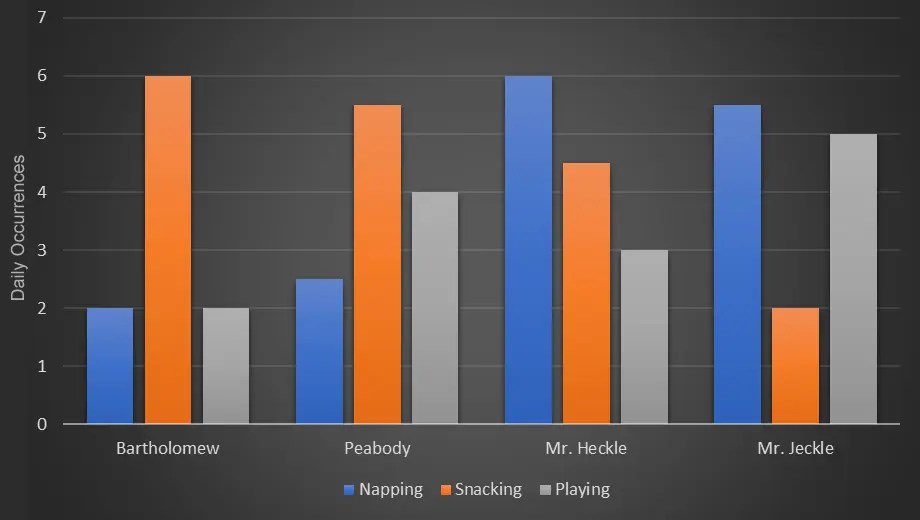Caption This: Mastering the Art of Figure Captions
In the digital jungle of information overload, visuals reign supreme. They grab our attention, sparking curiosity and driving engagement in ways plain text simply can't. But what good is a stunning infographic, a compelling photograph, or a data-rich chart without a companion to guide the viewer through its intricacies?
Enter the figure caption: a seemingly small element with the potential for a huge impact. It's the bridge between the immediacy of a visual and the depth of your message, providing context, interpretation, and a pathway for deeper understanding. Crafting effective figure captions isn't just about slapping on a descriptive sentence—it's about weaving a narrative that complements your visuals, enhances their impact, and leaves a lasting impression on your audience.
Think of a figure caption as a miniature story. It needs to grab attention, provide essential information, and ultimately, leave the reader with a clear takeaway. But unlike a sprawling epic, brevity is key. You're aiming for concise, impactful language that illuminates the visual without overshadowing it.
The evolution of figure captions mirrors the rise of visual communication itself. From the early days of scientific journals to today's social media feeds, the need to contextualize and explain visuals has been paramount. But with the explosion of digital content, the role of the caption has expanded. No longer just a descriptive tag, it's become an integral part of storytelling, brand building, and even SEO optimization.
Mastering the art of writing compelling figure captions is a critical skill in today's visually-driven world. Whether you're a scientist communicating research findings, a marketer striving for engagement, or simply someone who wants their visuals to pack a punch, understanding the nuances of this often-overlooked element can make all the difference.
Advantages and Disadvantages of Writing Effective Figure Captions
| Advantages | Disadvantages |
|---|---|
| Enhanced clarity and understanding for your audience | Requires time and effort to craft effective captions |
| Increased engagement and time spent on your content | Poorly written captions can detract from the visual's impact |
| Improved accessibility for visually impaired users | Can be challenging to strike the right balance between brevity and detail |
Best Practices for Crafting Compelling Figure Captions
1. Front-Load Essential Information: Start with a concise phrase or sentence that clearly identifies the figure's content. Think of this as the caption's "headline," providing immediate context.
2. Embrace Active Voice and Engaging Language: Opt for strong verbs and descriptive language to create a more dynamic and captivating experience for the reader.
3. Be Specific and Avoid Jargon: While brevity is key, avoid being overly general or relying on technical terms your audience may not understand. Provide enough detail to make the figure's meaning clear.
4. Proofread Meticulously: Just like any piece of writing, accuracy is crucial. Double-check for any typos, grammatical errors, or factual inconsistencies.
5. Consider Context and Audience: Tailor your language and level of detail to the platform, publication, and intended audience for your visuals.
Common Questions and Answers
Q: How long should a figure caption be?
A: There's no one-size-fits-all answer, but aim for conciseness. As a general guideline, keep captions to 2-3 sentences or under 100 words.
Q: Should I use a period at the end of a figure caption?
A: Yes, treat figure captions as complete sentences and end them with a period.
Q: Do I need to caption every single visual?
A: Not necessarily. If a visual is purely decorative and doesn't add to the content's meaning, a caption might not be needed.
Q: Can I use humor in figure captions?
A: It depends on the context. A touch of humor can be engaging, but make sure it's appropriate for your audience and doesn't undermine the message.
Q: How can I make my figure captions more accessible?
A: Use descriptive language that conveys visual information and consider alt text for screen readers.
Tips and Tricks for Figure Caption Success
* Use strong verbs to create a sense of action and immediacy.
* Incorporate relevant keywords to enhance SEO and searchability.
* Don't be afraid to get creative and experiment with different approaches.
In a world saturated with content, visuals have become indispensable tools for communication. But their power lies not just in their aesthetic appeal, but in their ability to convey complex information in an engaging and accessible way. By mastering the art of writing compelling figure captions, you unlock the full potential of your visuals, transforming them from mere images into powerful storytelling tools. Take the time to craft captions that inform, engage, and leave a lasting impression on your audience –– your visuals (and your readers) will thank you for it.
Unlock your potential free online reading comprehension pdf resources
Decoding 105 font size matters in the digital age
Funny sayings about being quick

Using APA Figures Correctly | Innovate Stamford Now

how to write a caption for a figure | Innovate Stamford Now

How To Write A Figure | Innovate Stamford Now

Bio 40 Lab: How to Create a Table for Your Lab Report | Innovate Stamford Now

How to Write Figure Captions for Graphs, Charts, Photos, Drawings, and Maps | Innovate Stamford Now

How to present Tables and Figures in your research work | Innovate Stamford Now

how to write a caption for a figure | Innovate Stamford Now

Using APA Figures Correctly | Innovate Stamford Now

how to write a caption for a figure | Innovate Stamford Now

Apa Style Table Captions | Innovate Stamford Now

Ini Dia Ulasan Paling Lengkap tentang Apa Itu Caption Instagram | Innovate Stamford Now

how to write a caption for a figure | Innovate Stamford Now

How to Add Captions in Word | Innovate Stamford Now

Standard Error Definition Psychology at Barbara Palma blog | Innovate Stamford Now

How to Cite a Picture in MLA | Innovate Stamford Now